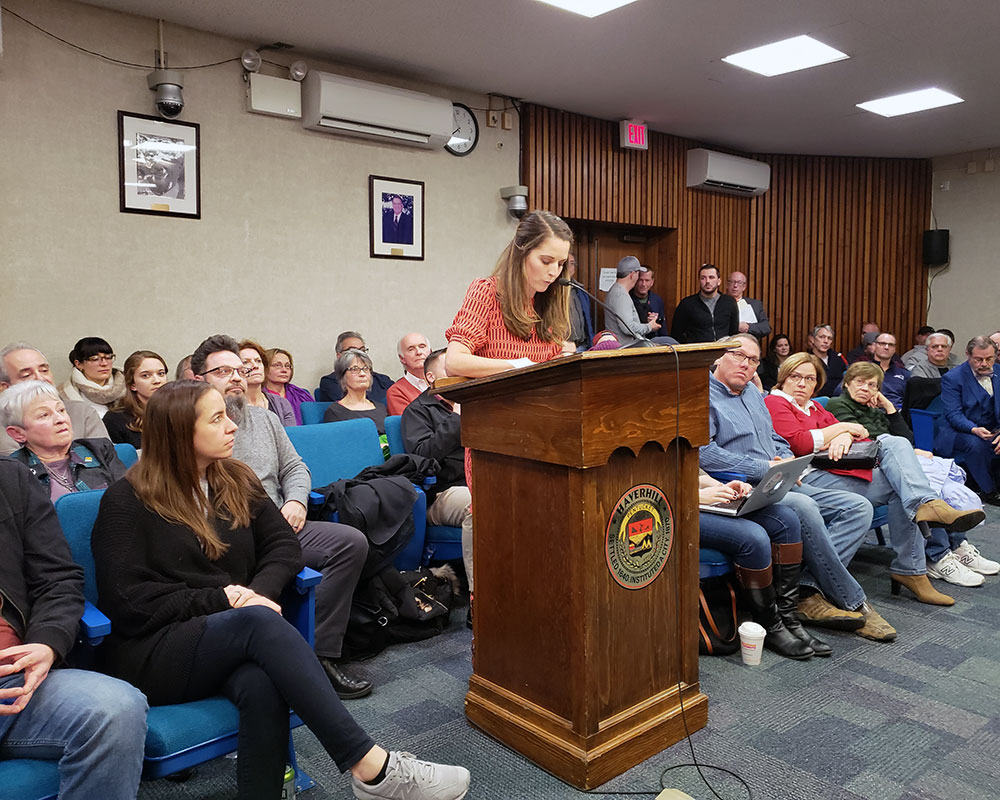At a standing-room only hearing, Caroline Pineau said she plans an “upscale, sophisticated and discreet” establishment. (WHAV News photograph.)
The sale of recreational marijuana in Haverhill stores advanced Tuesday night as Haverhill City Councilors approved seven zones across the city for such commerce.
Councilors, voting 7-1 in favor, said it was responsible to approve overlay zones since failure to do so would allow such stores to open anywhere in the city. Councilor Mary Ellen Daly O’Brien explained.
“We tried to find places that would be accessible, within the confines of what the Commonwealth of Massachusetts has us to do, and we did not want to leave it open so that anybody could put it anywhere. That was our number one fear,” Daly O’Brien said.
The lone holdout, Councilor Joseph J. Bevilacqua, cited concerns ranging from lack of parking to public health.
“Why would we want to have these locations—you know, right next to a community college…?—I understand why we want to do it, but why would we want to do it as a city when we’re facing the largest opioid crisis in the history of this city and we’re surrounded by it,” he said.
Bevilacqua said Merrimack Street, with its empty storefronts, is the part of downtown that needs economic development help, but it was excluded. The street was omitted because Councilors Melinda E. Barrett and Michael S. McGonagle, who are property owners there, would be prohibited from voting. Without a minimum number of votes, councilors explained, no zones could be approved.
McGonagle was absent from the meeting.
Approved zones include downtown Washington Street, Amesbury Road, Broadway off Computer Drive, Knipe Road, Plaistow Road, River Street and South Main Street.
Speaking against the plan were Deborah Rogers-Thornton, whose Knipe Street land is within one of the zones; Brad Brooks and Lloyd Jennings, owner of the building that houses the Hidden Pig restaurant on Washington Street; Stavros Dimakis, owner of Mark’s Deli, who expressed concern about parking; and Richard Lantini, another Ward Hill property owner.
In favor of the measure was Caroline Pineau, who plans to open a Washington Street shop; Michael Schroth; Greater Haverhill Chamber of Commerce President Dougan Sherwood; and business owners Phillip Rice and Elaine Barker. Pineau said she plans an “upscale, sophisticated and discreet” establishment.
“We’re simply trying to regulate cannabis like alcohol, and make sure that consumers have access to safe and tested product unlike the unsafe product currently being sold on the black market within our community,” Pineau said.
Creating the zones is not the last hurdle before stores open. Each applicant must negotiate host agreement with Mayor James J. Fiorentini and obtain a special permit from city councilors at future hearings. City Solicitor William D. Cox Jr. told WHAV future merchants do not have to have formal state approvals in advance in order to apply. He explained documents indicating they are eligible may be accepted.
